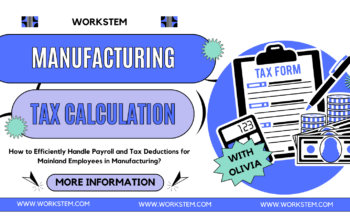The most important task for HR is to do repeated calculations, payroll settlement, taxation, employee data organization, etc., not just to tap on the computer randomly and make several copies of Excel. A competent HR officer should not only be familiar with labor laws and regulations, but also have a meticulous way of working, and follow the market trends to keep up with the dynamics of the HR market, such as the latest human resources system. It needs to be known as soon as possible.
Payroll calculation method
Just as in the case of dealing with employees’ payroll, every step should be extremely careful. If there are problems such as payroll running errors, we will face complaints from colleagues and may even cause labor disputes, which is the last thing both employees and companies want to see. So let’s discuss what should be paid attention to in the payroll calculation.
First of all, according to the Employment (amendment) Ordinance 2007 (commonly known as Ordinance 713, for it went into effect on July 13 in that year), after implementation, the statutory entitlements shall be calculated on the basis of the 12-month average daily wage (Ordinance 713) regardless of the payroll policy of an employee, including monthly, daily or piece-by-piece, and the periods and payrolls which are out of the calculation shall be excluded from the calculation of the average daily wage:
- Holiday pay
- Annual leave pay
- Sickness allowance
- Maternity leave pay (maternity leave of 10 weeks is only paid at 4/5 of payroll)
- Paternity pay
- Annual bonus
- Payment in lieu of notice
In Hong Kong, payroll is generally calculated in three ways: 1) hourly salary, 2) monthly salary, and 3) commission (with or without basic salary). The hourly salary system is mostly used for part-time, temporary or intern employees, while the other two systems are used for different types of work. For example, in the insurance industry, front-line employees generally use the commission system. The underwriting department and other logistics departments prefer using monthly salary system. Apart from the calculation of employee attendance and basic salary, the most complicated and frustrating part for HR department is the calculation of holiday pay, sickness allowance and so on.
Hourly salary
It can be considered the most common way to calculate payroll in Hong Kong. Since the Minimum Wage Ordinance formally implemented in 2011, every job posting you see on the street will have an hourly rate on it. Hourly rate dynamics in the market has become more and more popular among young people. During discussing salary, one of the most common topics is “what’s the hourly salary?”.
The minimum wage has been raised to HK$37.5 per hour on 1 May 2019. The statutory minimum wage applies to all employees in Hong Kong, except for live-in domestic helpers and interns, which are not covered by the Minimum Wage Ordinance.
It is relatively easy to calculate hourly-paid employees’ payroll and benefits. If the hourly-paid employee is a regular short-term employee, their payroll can be calculated based on their working hours and the agreed hourly salary. In other words, if they don’t work, they don’t get paid. However, if an employee is eligible for “418” (continuous contract), the employer is required to provide rest days, paid holidays, sickness allowance, etc. Therefore, many employees neglect to have such benefits. It should be noted that the employees:
- Who has been employed under a continuous contract for 3 months, will get holiday pay on statutory holidays (12 days per year).
- Who has been employed under a continuous contract for 12 months, will get annual leave (minimum 7 days, increasing to 14 days each year thereafter, which employer and employee can negotiate to adjust the amount of paid annual leave upward)
Monthly salary
Compared with the hourly salary system, the calculation method of monthly salary system will be relatively complicated. The common one is the calculation method including regular holidays, that is, the monthly salary includes working days and regular holidays, so the average daily wage = (monthly salary/number of days of the month). This method will be relatively simple and easy to calculate. But under this method, the minimum monthly salary is HK$9,000 for an 8-hour working day (30 days). Therefore, for some employees with a monthly salary of less than HK$10,000, this may violate the Minimum Wage Ordinance. So there is another kind of calculation method not including regular holidays, that is, assuming a 30-day month, minus 8 regular holidays (4 x 2 weekends) and 8 hours of work per day, excluding “meal time”, the total number of working hours per month is 176 hours. The minimum monthly salary is HK$6,600 and the average daily wage is calculated on the basis of (monthly salary/22 days).
However, OT is a very common thing in Hong Kong. A survey in 2015 showed that employees in Hong Kong work the longest OT hours in Asia, even 20 percent of them work 4 to 6 hours overtime every week. For example, Xiao Ming is an ordinary company employee. His monthly salary is HK$8,500, he works 9 hours a day, and he is entitled to 4 days’ paid holiday every month. So his hourly salary is:
8,500/[9x(30-4)]≈HK$36.3/hour
If Xiao Ming works 5 hours overtime a week, his hourly salary will be:
8,500/[9x(30-4)+4×4]≈HK$33.4/hour
In this case, the employer may be involved in the labor dispute because of the violation of the Minimum Wage Ordinance, which is not worth the loss.
Commission(with or without basic salary)
In Hong Kong, people engaged in the sales industry are mostly paid by commission. If based on the basic salary + commission system, the amount of basic salary must comply with the Minimum Wage Ordinance. Also, some employees are purely paid by commission (no basic salary), so it’ll get more complicated when calculating entitlements such as holiday pay and sickness allowance.
First, do employers not have to pay employees extra holiday pay in a commission-only system? In fact, it looks reasonable on the surface. No basic salary system is equivalent to “more work, more pay”, then no work, no pay.
In August 2015, PHYSICAL Fitness & Beauty Company was sued by the government for not paying its employee statutory holiday pay. The employee claimed that the company did not pay her statutory holiday pay, but the company claimed that the employee’s minimum commission had already included holiday pay (HKD10, 000 per month, without basic salary), which was related to the violation of the Employment Ordinance. It’s also said that companies could not assume that commission or piece-by-piece pay included holiday pay, so PHYSICAL was convicted.
Vacation = No work =Base Pay?
If you calculate one day paid leave for your colleague on the basis of base pay or just minus one day salary, you are making a big mistake. After the Employment (Amendment) Ordinance 2007 came into force, no matter what payroll policy you are using, the legal rights and interests must be calculated on the basis of 12-month average daily wage (ADW), excluding periods and wages that should not be counted according to the related ordinance.
Let’s say a salesman whose monthly salary is composed of HK$10,000 basic salary and commission, and his total salary (including basic salary and commission) in the last 12 month is HK$240,000 and he is paid on rest days.
In the last 12 month he has 71 days’full paid leave, including:
- 52 rest days
- 12 statutory holiday
- 7 days of annual leave ( a minimum of seven days, increasing to 14 days annually thereafter, with employers and employees negotiating the amount of annual leave)
If he has not been paid less than full wages in the past 12 months, the period and amount to be excluded are both “0”. Then his average daily wage should be:
240,000/365≈HK$658

Keep up with the HR market
As a professional HR, technical skills are essential. You must master related laws and regulations such as the Employment Ordinance, the Minimum Wage Ordinance,and so on. Most HR professionals are from the same educational background, so they comprehend basic knowledge and skills having no problems with administrative work. But now people emphasize“Efficiency”everywhere, so in addition to essential knowledge about human resources , rich experience and outstanding competence which lead to more efficient and accurate work will be more important to a professional HR.
Take HR in large companies for example. When resources are available, HR centers on the department, not a few individuals. A systematic division of labor can improve efficiency. Employees from one department can do different jobs, such as Head Hunting/Staffing, Payroll, Taxation and Claiming.
Head Hunting can also be divided into senior managers, mid-level and front-line staff, and recruitment can be done separately. Senior managers need to spend a lot of time and energy searching for higher-quality talents, the mid-level and front-line staff should find employees who work for the company’s operations and activities. For example, the promotion department needs dozens of promoters, the marketing department needs hundreds of temporary staff to hold events, and so on. These kinds of situations require a large number of employees in a very short time to ensure all events can be held successfully. Therefore, a clear division of labor can improve efficiency and allow employees to focus on a particular job to gain more experience. However, this approach is double-edged. From the staff’s point of view, it is more difficult for them to touch jobs in other fields.Many staff may only know one job from the beginning to the end of their employment, which limits their mobility and development.
This is more obvious in payroll, where complex administrative tasks and professional knowledge are both needed, and HR staff have to constantly keep up with market developments and the newest dynamics, taking regular classes and participating in reviews. In order to be efficient, companies need to customize a payroll system, otherwise they have to spend a lot of time dealing with these meaningless and trivial tasks. Another option would be to outsource the work to a professional human resources firm, which means to create an extra department to deal with administrative tasks such as payroll, companies can then assign HR to more valuable work, such as talent recruitment, and so on. In this way, even small and medium-sized enterprises can achieve“Efficiency”.







